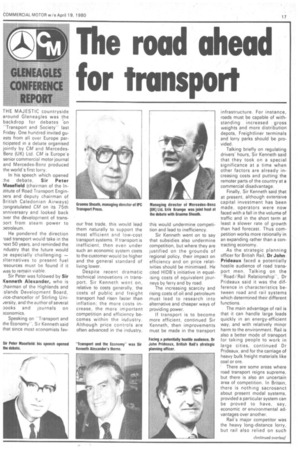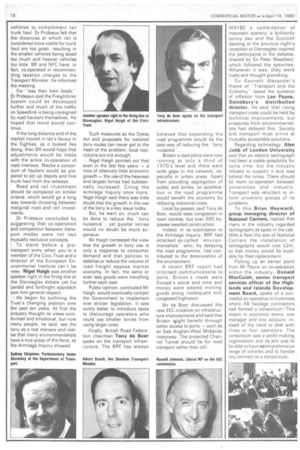The road ahead for transport
Page 19

Page 20

If you've noticed an error in this article please click here to report it so we can fix it.
THE MAJESTIC countryside around Gleneagles was the backdrop for debates 'on "Transport and Society' last Friday. One hundred invited guests from all over Europe participated in a debate organised jointly by CM and MercedesBenz (UK) Ltd. CM is Europe's senior commercial motor journal and Mercedes-Benz produced the world's first lorry.
In his speech which opened the debate, Sir Peter Masefield (chairman of the In3titute of Road Transport Enginaers and deputy chairman of British Caledonian Airways) congratulated CM on its 75th anniversary and looked back Dyer the development of transport from steam • power to Petroleum.
He pondered the direction • oad transport would take in the lext 50 years, and reminded the ndustry that the future would
e especially challenging — alternatives to present fuel 'esources must be found if it was to remain viable.
Sir Peter was followed by Sir Kenneth Alexander, who is :,-hairman of the Highlands and Islands Development Board, vice-chancellor of Stirling University, and the author of several 000ks and journals on 3conomics.
Speaking on "Transport and the Economy', Sir Kenneth said that since most economists fav our free trade, this would lead them naturally to support the most efficient and low-cost transport systems. If transport is inefficient, then even under such an economic system costs to the customer would be higher and the general standard of living lower.
Despite recent dramatic technical innovations in transport, Sir Kenneth went on, relative to costs generally, the costs of public and freight transport had risen faster than inflation; the more costs increase, the more important competition and efficiency becomes within the industry. Although price controls are often advanced in the industry, this would undermine competition and lead to inefficiency.
Sir Kenneth went on to say that subsidies also undermine competition, but where they are justifiad on the grounds of regional policy, their impact on efficiency and on price relativities should be minimised. He cited HIDB's initiative in equalising costs of equivalent journeys by ferry and by road.
The increasing scarcity and rising costs of oil and petroleum must lead to research into alternative and cheaper ways of providing power.
If transport is to become more efficient, continued Sir Kenneth, then improvements must be made in the transport infrastructure. For instance, roads must be capable of withstanding increased gross weights and more distribution depots, Freightliner terminals and lorry parks should be provided.
Talking briefly on regulating drivers' hours, Sir Kenneth said that they took on a special significance at a time when other factors are already increasing costs and putting the remoter parts of the country at a commercial disadvantage.
Finally, Sir Kenneth said that at present, although extensive capital investment has been made, operators were now faced with a fall in the volume of traffic and in the short term at least a slower rate of growth than had forecast. Thus competition works more rationally in an expanding rather than a contracting economy.
As the strategic planning officer for British Rail, Dr John Prideaux faced a potentially hostile audience of road transport men. Talking on the -Road/Rail Relationship-, Dr Prideaux said it was the difference in characteristics between road and rail systems which determined their different functions. .
The main advantage of rail is that it can handle large loads quickly in an energy-efficient way, and with relatively minor harm to the environment. Rail is also a better mode of transport for taking people to work in large cities, continued Dr Prideaux, and for the carriage of heavy bulk freight materials like coal or ore.
There are some areas where road transport reigns supreme, but there is also an uncertain area of competition. In Britain, there is nothing sacrosanct about present modal systems, provided a particular system can be proved to have, say, economic or environmental advantages over another.
Rail's major competitor was the heavy long-distance lorry, but rail also relied on such vehicles to complement rail trunk haul. Dr Prideaux felt that the distances at which rail is considered more viable for trunk haul are too great, resulting in the smaller vehicles being taxed too much and heavier vehicles too little. BR and NFC have, in fact, co-operated in recommending taxation charges to the Transport Minister, he informed the meeting.
For "less than train loads;' Dr Prideaux said the Freightliner system could be developed further and much of the traffic on Speedlink is being consigned by road hauliers themselves. He hoped that trend would continue.
If the long distance end of the market moved in rail's favour in the Eighties, as it looked like doing, then BR would hope that adjustments would be made with the active co-operation of road interests. Maybe a consortium of hauliers would be prepared to set up depots and hire trunk haul from the railways.
Road and rail investment should be compared on similar criteria, which would go a long way towards choosing between marginal road and rail investments.
Dr Prideaux concluded by suggesting that co-operation and competition between transport modes were not two mutually exclusive concepts.
To stand before a protransport army when you're a member of the Civic Trust and a director of the European Environmental Institute can't be easy. Nigel Haigh was another speaker right in the firing line at the Gleneagles debate yet his candid and forthright approach won him general respect, He began by outlining the Trust's changing position over the past ten years. At first the industry thought its views uninformed and emotional, but now many people, he said, see the lorry as a real menace and realise that many environmentalists have a true grasp of the facts, as the Armitage inquiry showed.
Such measures as the Dykes Act and proposals for national lorry routes can never get to the heart of the problem: local restrictions are not enough.
Nigel Haigh pointed out that even in the last few years — a time of relatively little economic growth — the use of the heaviest and largest lorries had substantially increased. Citing the Armitage Inquiry once more, Nigel Haigh said there was little doubt that the growth in the use of the lorry is a key issue today.
But, he went on, much can be done to reduce the "lorry nuisance", yet quieter lorries would no doubt be more expensive.
Mr Haigh contested the view that the growth in lorry use is only a response to consumer demand and that policies to stabilise.or reduce the volume of road freight oppose market economy. In fact, the same or even less goods were travelling further each year.
Public opinion, concluded Mr Haigh, would eventually compel the Government to implement ever stricter legislation. It was surely better to introduce taxes to discourage operators who could use smaller lorries from ,using larger ones.
. Finally, British Road Federation chairman Tony de Boer spoke on the transport infrastructure. The BRF has •always believed that expanding the road programme would be the best way of reducing the -lorry nuisance".
Britain's road plans were now running at only a third of 1970's level and there were wide gaps in the network, especially in 'urban areas. Apart from providing segregation of public and lorries, an acceleration in the road programme would benefit the economy by reducing industrial costs.
Local by-passes, said Tony de Boer, would ease congestion in town centres, but over 500 bypasses awaited construction.
Indeed, in its submission to the Armitage Inquiry, BRF had attacked so-called "environmentalists" who, by delaying the road programme, had contributed to the deterioration of the environment.
A recent BRF report had criticised communications to ports. Britian's roads were Europe's worst and time and money were wasted moving goods along inadequate and congested highways.
Mr de Boer discPssed the new EEC initiative on infrastructure improvements and said that Britain Night benefit through better access to ports — such as an East Anglian-West Midlands motorway. The projected Channel Tunnel should be for road transport rather than rail. MAYBE a combination of mountain scenery, a brilliantly sunny day and the Scottish dancing at the previous night's reception at Gleneagles inspired the participants in the debates, chaired by Sir Peter Masefield, which followed the speeches. Whatever it was, they were lively and thought provoking.
Sir Kenneth Alexander's theme of -Transport and the Economyrasied the question of inflation from Len Payne,
Sainsbury's distribution director. He said that rising transport costs could be held by technical improvements, but pressures from environmentalists had delayed this. Society and transport must arrive at mutually acceptable solutions.
Regarding technology, Alan Jebb of London University said that an electric tachograph had been a viable possibility for some time, but the industry refused to support it and was behind the times. There should be more co-operation between universities and industry. Transport was reluctant to inform university groups of its problems.
To this Brian Hayward, group managing director of National Carriers, replied that many in the industry regarded tachographs as spies in the cab. With a fleet the size of National Carriers the installation of tachographs would cost E2m, so less money would be available for fleet replacement.
Picking up an earlier point from Mr Payne on co-operation within the industry, Donald MacCuish, senior transport services officer of the Highlands and Islands Development Board, spoke of a successful co-operative in Inverness where 48 haulage contractors had formed a consortium.This meant in economic terms, one manager and one account, instead of the need to deal with three or four operators. The consortium was a profit-making organisation and its aim was to be able to have acomprehensive range of vehicles and to handle any contract as a consortium..












































































































